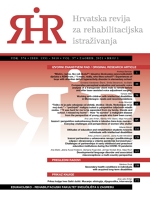"Mislim, realno, tko voli školu?": Iskustvo školovanja osnovnoškolskih dječaka s ADHD-om
“I mean, really, who likes school?”: Experiences of boys with attention deficit hyperactivity disorder in elementary school
Author(s): Andreja BartolacSubject(s): School education, Developmental Psychology, Neuropsychology, Clinical psychology, Health and medicine and law, Inclusive Education / Inclusion, Pedagogy
Published by: Sveučilište u Zagrebu, Edukacijsko-rehabilitacijski fakultet
Keywords: neurodiversity; child interview; interpretative phenomenological analysis;
Summary/Abstract: Although attention deficit hyperactivity disorder (ADHD) is one of the most common neurodevelopmental disorders observed in childhood, ADHD research in Croatia, especially studies involving children, are extremely rare. Therefore, the aim of this paper was to describe the personal everyday school life experiences of boys with ADHD who were studying in elementary schools. This study included a purposive sample of 14 boys with ADHD aged 8 to 11 years who attended mainstream elementary schools. Three semi-structured phenomenological interviews were conducted with each boy. Special attention was given to ensure that the methodological approach used in this study was child-centred, child-friendly, and child-safe. Interpretative phenomenological analysis was used to analyse the data. Data collected on the school experiences of the boys with ADHD are presented via two themes: (1) challenges of schooling with ADHD, and (2) support at school: the importance of recognition, sensitivity, and relationships. This study demonstrates that boys with ADHD can recognize the challenges associated with their schooling and find it very difficult to take part in school activities that require directing and maintaining attention, organization, perseverance, flexible attention, and working memory. Consequently, the boys reported that they experience failure, frustration, and reduced self-confidence in their own abilities. Boys participating in this study were able to recognize the support received at school from their teachers and teaching assistants, as well as the obstacles that occurred due to misunderstandings, lack of sensitivity to their neurodiversity, and failure to apply the Individualised Education Program. The boys also provided clear descriptions of the adjustments necessary to make their school experience easier. The results of this study illustrate that children with ADHD face specific psycho-social risks, followed by recommendation that their experiences should be considered during the development of educational policies, given their participatory rights and their role as equal stakeholders.
Journal: Hrvatska revija za rehabilitacijska istrazivanja
- Issue Year: 57/2021
- Issue No: 1
- Page Range: 1-39
- Page Count: 39
- Language: English, Croatian

